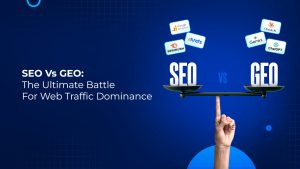SEO or. Content Marketing – what works best to gain website visibility in the search results?
Search engine algorithms maintain a structured system to analyze and rank web pages efficiently. The system ensures that users find relevant information and access desirable products and services.
Users are heavily dependent on search results to locate digital businesses. Therefore, it is lucrative for the owners to take up online marketing measures. It helps reach the target audience and facilitate digital growth.
However, there are several marketing mediums. Which one to choose?
While an SEO expert will tell you search engine optimization is the ideal method, a content marketing expert will offer other techniques.
In this comprehensive blog, we will compare SEO and Content marketing and explain which works best for businesses aiming for better visibility and growth.
Understanding SEO and Content Marketing
Let us begin by understanding the basics of SEO and Content marketing tactics and what each entails. It is critical to comprehend the methodologies and how they aid a business in growth.
What is SEO?
Search Engine Optimization, or SEO, focuses on improving a website’s visibility in search engine results pages (SERPs). It includes platforms like Google, Bing, and Yahoo.
SEO measures aim to increase organic traffic to a website and acquire higher ranks for relevant keywords. When users search for a specific term related to the business, the website appears at the top of the results page.
What does SEO include?
SEO involves a combination of techniques addressing on-page and off-page factors. On-page SEO refers to optimizing the content and elements of the website itself.
It entails –
- Keyword Research: Identifying relevant keywords and phrases the target audience is searching.
- On-Page Optimization: Incorporating the keywords naturally across the website content, such as Meta tags, headings, and image alt text.
- Content Creation: Producing high-quality, relevant, and engaging content valuable to the audience.
- Technical SEO: Ensures the website is technically sound and easily crawled and indexed by search engines. The process involves optimizing website structure, load speed, mobile friendliness, and XML sitemaps.
Off-page SEO focuses on building external links to the website from other reputable websites, ensuring authority. High-quality backlinks (external links) signal to search engines that the website is valuable and relevant.
It entails –
- Guest Posting: Writing articles for other websites in the industry and incorporating links back to the original website.
- Backlink Outreach: Building relationships with other websites and requesting links.
- Social Media Marketing: Promoting content on social media platforms to increase visibility and generate backlinks.
Every SEO measure focuses on better visibility and technical relevant web pages to hint search engines of credibility and relevance.
What is Content Marketing?
Content marketing is a strategic approach to content and involves creating and distributing valuable, relevant, and consistent information.
The content helps attract and retain a clearly defined audience and directs them toward the sales funnel. The objective is to build relationships with potential customers and provide them with valuable resources.
While traditional marketing focuses on promoting products or services, content marketing focuses on informative and engaging content delivery.
High-quality content positions businesses as thought leaders in the industry and helps establish trust among the target audience. It increases brand awareness, lead generation, and customer loyalty.
What does Content Marketing entail?
There are many different forms of content marketing, and the generic options include –
- Blogs: Regular blog posts are a great way to share information, updates, and insights with the audience and inform them about business trends and events.
- Videos: Currently, videos are a powerful tool for educating, entertaining, and engaging the audience.
- Infographics: Infographics are a visually appealing way to present data and information to a modern audience that avoids textual content.
- Ebooks: Ebooks are valuable resources for audiences and can be used to generate leads and build relationships.
- Social Media Posts: Sharing content on social media platforms helps reach a broader audience base and engage directly with the followers.
Content marketing is not a one-time activity and demands a consistent and ongoing effort. Effectively producing high-quality content, builds a firm online presence, and drives long-term growth.
SEO vs. Content Marketing: The Key Differences
While SEO and content marketing are utilized together in a marketing process to achieve broader marketing goals, they have distinct objectives. The approaches are different, and the metrics are calculated separately.
As a business deciding upon marketing medium, it is crucial to understand these differences and plan strategies.
Here are the fundamental differences based on separate categories –
1. Objective and Approach
SEO: The primary objective of SEO is to improve a website’s visibility in the results pages and attract organic traffic. The process involves optimizing website content, technical aspects, and backlinks to enhance search engine rankings.
SEO is a more technical approach and requires knowledge of search engine algorithms and optimization techniques.
Content Marketing: It aims to attract and engage a targeted audience by creating and distributing valuable and consistent content. It focuses on building relationships with potential customers and establishing authority within the industry.
Content marketing is a creative and narrative domain, emphasizing storytelling and audience engagement through resources.
2. Timeframe
SEO: SEO results take longer to materialize. It can be several months before a website starts seeing significant improvements in rankings and traffic. Factors like website competition, search engine algorithm updates, and the quality of SEO efforts influence the timeframe.
Content Marketing: Content marketing offers quicker audience engagement and lead generation results. With high-quality content resonating with the target audience, businesses attract the target audience and build relationships.
However, brand awareness and customer loyalty are long-term success metrics, and it takes time to showcase relevant outcomes.
3. Metrics
SEO Metrics –
Organic Traffic is the most fundamental metric for SEO. It measures the number of visitors to a website who come directly from search engines.
Increasing organic traffic through targeted keywords is considered a positive SEO result. Other valuable metrics include bounce rate, time on site, and conversion rates.
SERPs Ranking: It measures a website’s position in search engine results pages (SERPs) for specific keywords. It is vital to track changes in rankings over time and analyze their impact on organic traffic.
An SEO agency uses keyword research tools to identify keywords with high search volume and low competition. After incorporating the keywords, analysis tools measure the positions and success rate.
Click-Through Rate (CTR) measures the percentage of people who click on a search result link. It indicates whether users find the website relevant and engaging.
Content Marketing Metrics –
Engagement: It measures the level of interaction with the content, including likes, shares, comments, and time spent on the page. A content marketing agency can analyze the types of content that resonate with the audience and tailor the future content strategy accordingly.
Leads: It measures the number of potential customers who provide their contact information in exchange for content. Ebooks, webinars, and free consultations are impressive lead-generation sources and make future marketing easy.
Conversions: It measures the number of people who take a desired action, like purchasing a product or signing up for a newsletter. The content can be optimized accordingly to improve conversions.
Brand Awareness: It measures the recognition and familiarity of the brand among the target audience. The process involves tracking brand mentions, social media followers, and website traffic.
Social Media Engagement measures the level of interaction with content on social media platforms. Tracking metrics like likes, shares, comments, and mentions helps understand social media success.
The metrics offer valuable insights into the effectiveness of the SEO and content marketing efforts and help make data-driven decisions to improve business promotion and digital growth.
The Synergy between SEO and Content Marketing
From a business point of view, understand that SEO and content marketing are not mutually exclusive. The efforts collaborate to create a powerful marketing approach.
SEO benefits in content creation as it serves as the backbone. Simultaneously, SEO’s impact on content marketing enhances brand visibility. Understanding each aspect and their synergy helps optimize their online presence and achieve their marketing goals.
Content as the Backbone of SEO
High-quality content is essential for SEO. Search engines value websites with relevant and informative content.
It is critical to create content that addresses the needs and interests of your target audience. A user-focused approach effectively attracts organic traffic from search engines.
Keywords are crucial in a content marketing and SEO strategy. Incorporating relevant keywords improves website visibility in the results pages.
Furthermore, the keyword research process helps identify the terms and phrases the target audience is searching for. Businesses can then better understand what their target audience is seeking online and deliver accordingly.
SEO Enhances Content Visibility
SEO techniques significantly improve the visibility of content marketing efforts. Optimizing the website’s technical aspects, like site speed and mobile-friendliness, makes it easier for search engines to crawl and index the content.
Additionally, high-quality backlinks from other reputable websites signal search engines that the content is valuable and relevant.
When the content is optimized for search engines, it has a better chance of appearing in the top search results for relevant keywords. It leads to more organic traffic, leads, and conversions.
Using Data from SEO to Inform Content Strategy
SEO analytics provide valuable insights into content marketing efforts. Businesses can track metrics like organic traffic, keyword rankings, and user behavior. Additionally, they can identify high-performing content and areas for improvement.
SEO data helps refine the content strategy and creates effective content that resonates with the target audience.
For instance, if an SEO expert notices that a particular piece of content is generating a lot of organic traffic and engagement, they can create similar content to capitalize on its success. Conversely, specific pieces of content that are not performing well can be analyzed for necessary adjustments.
Building a Winning Strategy with Both SEO and Content Marketing
To achieve maximum success with your online marketing, it is essential to combine SEO and content marketing efforts. It all comes down to aligning the marketing efforts with the marketing goals and focusing on the users.
Remember, continuous optimization is vital. Both SEO and content are evolving based on user demands. Therefore, a user-focused move is a winning strategy.
Aligning Goals and Objectives
- Start by establishing clear and measurable goals encompassing SEO and content marketing. The goals must include increasing organic traffic, generating leads, improving brand visibility, or driving sales.
- Ensure the content creation aligns with the SEO goals. Identify relevant keywords and incorporate them naturally into content without compromising quality or readability. Use SEO tools to research popular search terms related to your industry and target audience. Experts can also utilize the tools to study competitor businesses.
Creating SEO-Friendly Content
- Conduct thorough keyword research to identify relevant terms and phrases in the niche. Discover popular search terms, search volume, and competitiveness.
- Organize content in a logical and easy-to-read structure. Utilize headings, subheadings, and bullet points to break up content and improve readability.
- Prioritize user experience and ensure the web pages are easy to navigate, load quickly, and are mobile-friendly. Utilize clear and concise language accessible to all; avoid business jargon.
- Link to relevant pages within the website to enhance navigation and help search engines understand the structure and hierarchy of the website.
- Optimize imagery with descriptive file names and alt text to improve search engine visibility and user experience.
Ongoing Optimization and Content Updates
SEO and content marketing are ongoing processes in the marketing cycle. Be mindful and regularly monitor the website performance to make necessary adjustments. The prime goal is to improve rankings and engagement. Therefore, keep learning about the search engine algorithm updates and industry trends.
In content marketing, focus on adding more relevant and rank-worthy content to keep the website competitive. For SEO, ensure the website’s technical aspects are up-to-date. This includes optimizing website speed, mobile friendliness, and XML sitemaps.
When it comes to business growth, it is not about search engine optimization vs. content marketing. The objective is to combine SEO and content marketing to achieve organic traction within the domain.
Common Challenges and How to Overcome Them
While SEO content marketing is highly effective, it is vital to be aware of common challenges and how to address them.
Balancing Creativity with SEO Requirements
The biggest challenge is combining SEO and content marketing and maintaining creativity while adhering to algorithm guidelines.
It is essential to avoid sacrificing the quality and engagement of the content to meet SEO requirements.
Here are some content marketing SEO tips to keep in mind –
- Prioritize Quality: Focus on creating high-quality, engaging, and valuable content for the target audience.
- Natural Keyword Integration: Incorporate keywords naturally into the content rather than forcing them in. Aim for a smooth flow and avoid keyword stuffing. The content must be created with the user in mind and not the search engine.
- Use a Variety of Keywords: Instead of focusing on a single keyword, use varied related keywords throughout the content. It helps to rank for a broader range of search terms.
- Consider User Intent: Understand the intent behind search queries and create content addressing user needs and interests.
- Monitor Your Performance: Track performance and make adjustments as needed. If you notice a decline in rankings or engagement, it may be a sign that the content is over-optimized.
By addressing these common challenges and following best practices, you can effectively combine SEO and content marketing to achieve online marketing goals.
SEO vs. Content Marketing – The Ideal Path for Your Business
We are at the end of our discussion of SEO vs. Content marketing for businesses. As a reputable SEO agency in London, we conclude that there is no perfect answer.
Each domain is not exclusive to the other.
Content marketing for SEO success and SEO techniques in content marketing are collaborative approaches to organic business promotion.
We recommend investing in both for a desired result in sales, conversion, and return on investment.
At Webskitters Technology Solutions Pvt. Ltd., you can avail yourself of advanced SEO and content marketing services for your business needs. Our experts have a proven track in developing the perfect SEO content marketing plan for business growth and visibility.
Consult today for SEO-driven content strategies!


 September 16, 2024
September 16, 2024 








